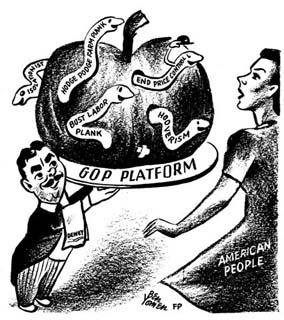To quote from the Publishers Weekly review—
Robinson's self-help/memoir/Reagan hagiography is an All I Really Need to Know I Learned in Kindergarten for right-wingers. The former White House speechwriter… illuminates 10 life lessons in a love letter to the Gipper ("How," Robinson asks, "did such a nice guy get to be President?"). By looking at both the historical (supply-side economics, the Cold War, Iran-contra) and the personal (Reagan's beliefs, his relationship with his family), Robinson unearths maxims such as "Do your work" and "Say your prayers."The real Reagan has been cleansed from the mainstream narrative.
The reality of his nasty domestic policies: war on the poor—and union workers. The start of a drastic redistribution of wealth upward that has by now all but finished off the working and middle classes.
And there was Reagan's foreign policy, including support of killers in Nicaragua—policy carried out by subverting the Constitution in the Iran-Contra end-run around Congress.
Facts that I want to get to in more detail, over the coming months.
But following Robinson's lead for now: some personal remarks about the feelings Reagan "inspires" in me.
Because Ronald Reagan certainly changed life for me—and the non-elite part of the country—and in ways not as lucrative as they have been for Mr. Robinson.
Before Reagan, I usually had minimum wage jobs—and lived perfectly well on them. In those days, it was common wisdom that rent should not be more than 25% of income; because the relationship between income and cost of living was realistic, it was not that hard to rent a nice enough place on minimum wage.
Along with changing all rules and reasonable expectations, Reaganomics fueled the real estate speculation and city neighborhood gentrification that killed "25% for rent."
Reaganism brought a multi-faceted attack on labor—including policies like raising tax rates for the bottom and taxing unemployment checks.
Thirty years later, with positions scarce and employers holding all the cards: I, like so many of those still employed, work in conditions constantly being made more unreasonable. And I'm one of the "lucky ones": my excessive workload keeps getting increased, but at least the pay has not been cut.
For me, a really telling thing about life before and after:
pre-Reagan, I never would have dreamed of buying lottery tickets.
In the years since hitting some numbers became the only way out, I sometimes throw away a couple of bucks, in search of feeling some hope for a few hours.
That chipping away at hope is the most insidious product of Reaganism.
The mainstreaming of what was once considered wacko Bircher ideology has been subverting our institutions for decades. And its use of hatred as a tactic of political control has had particularly painful effects lately.
I can remember being the age at which Christina Green was murdered.
As long ago as age nine was for me, I vividly remember my own idealism then: believing in the goodness of America, writing heartfelt entries for civics essay contests, and all that kind of thing.
Reagan's pitch that "government is the problem" has functioned as a form of terrorism, indoctrinating much of the public and poisoning our politics over the last thirty years. It has brought us this far into the rollback of the New Deal that Reagan's backers were always after.
 Illinois Federal Art Project, 1937
Illinois Federal Art Project, 1937 Library of Congress
The poster is an optimistic reminder of an era when optimism was hard-earned.
Reagan is always touted as "a sunny optimist," but in his youth, families like his own gained hope in seeing they would get by, thanks to the government's helping hand.
Things gradually became better for so many; after the war prosperity grew, due to liberal policies like infrastructure spending and a progressive tax.
Post-war, things certainly went well for Reagan: well enough for him to become rich and turn on his past.
I grew up in a time when average families did fine on one income; prosperity for much of the populace was the legacy of the New Deal; and things were expected to continue becoming better, as a matter of course.
The long downward spiral began when Reagan's demonization of government was turned into conventional wisdom.
The chance of things improving in my lifetime feels less and less likely each day, and that's good reason for my resentment of the "sunny optimist" and his PR machine.
Along with the prospect of living wages, working in decent conditions, having a civilized society's access to health care and the possibility of retirement, "leisure time" is about as scarce as jet packs, monorails, or any other fruits of the glorious future predicted for us when I was growing up.
























